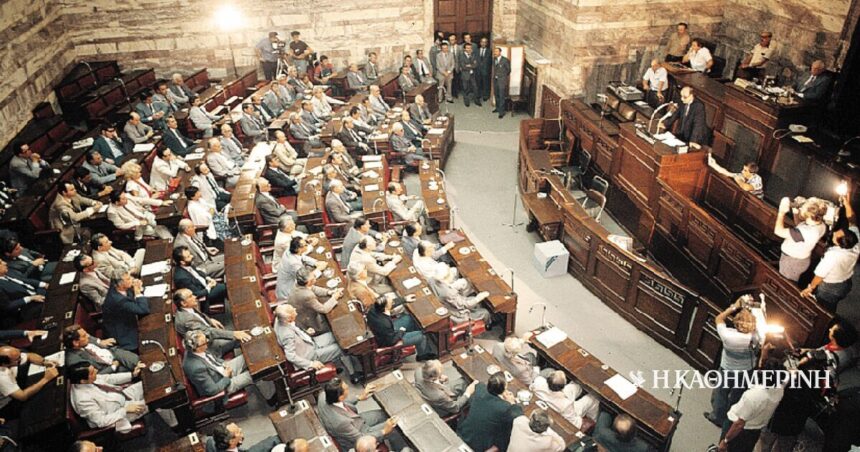His election Konstantinou Mitsotakis As ND president, on September 1, 1984, it came during a very difficult period for the party, after a time of organizational restructuring under the Evangelos Averof-Tositsaand was a key step in adapting the Greek Right to the new Western Government models in the 1980s. Mitsotakis remained in the leadership until 1993 and is one of the longest -running party presidents to this day.
Center of the center
Mitsotakis was an unexpected case for the Presidency of ND. One of the most capable politicians of the postwar era had, however, lately identified with the policies of the Center rather than the new, postpapan or Karamanlian center -right. Basic expressor of Venizelian tradition (the two families were closely related and he was his nephew Eleftheriou Venizelos), Mitsotakis fought During the Italian -German invasion, while distinguished in the Cretan resistance against the Germans by the ranks of the National Organization of Crete, when it played an important role in avoiding the Civil War in Megalonissos.
Then, was elected in 1946 and assumed ministerial duties in 1951-52. However, in the very difficult of the 1950s the center was unable to emerge: the newest executives of the faction were settled before the “annual” of the old, namely Georgiou Papandreou and his Sophocles Venizeloswhich were also intensely competitive with each other. This exacerbated the political problem of the faction, which was difficult to compete with his rushing Karamanlis.
Following the “unfaithful struggle” in which he starred, during the years of central governance after 1963, Mitsotakis emerged as a possible successor to G. Papandreou and involved in a serious intra -party dispute with the son of Prime Minister Andreas. However, their competition was not just about claiming office. There was an extremely serious, strategic, disagreement between them.
Mitsotakis, more oriented to classical liberal agenda and a prudent economic policy, believed that the pillars of fiscal stability should not be attentive with the immense expansion of public spending. THE Andreas PapandreouOn the contrary, it was in favor of fiscal expansion on the grounds that it would also facilitate the upward trend of the economy. The outcome of their controversy in the 1960s was a very complex affair. In the field of economic policy, Mitsotakis prevailed, who, as Minister of Coordination of the Government of the “Apostles”, boldly and effectively confronted the financial crisis of December 1965.
At the political level, however, Andreas Papandreou, who was established as the leader of a new center -left, prevailed at a time when the “apostates” lost their backgrounds in the center. Andreas prevailed endoparam and politically, although he was unable to implement the economic policy he preferred until the 1980s.
Top Ministries in ND governments
In the following years, for Constantine Mitsotakis a course in the desert was for Konstantinos Mitsotakis. Hunt’s strong opponent, from which he was targeted, self -exiled abroad, first promoted the possibility of a ‘Karamanlis’ solution’ to resolve the impasse. However, he was not invited by Karamanlis to take on political roles in the new ND party. in 1974. He was re -elected to Parliament only in 1977 and entered the ND government. as Minister of Coordination in 1978, during another center of enlargement. The case of 1978 was neither unique nor unusual: post-war right made similar expansions to the center constantly in 1946, in 1951-52 (Papagos), in 1956 (Karamanlis), 1974 and 1978. More would follow.
As a leading politician in the classroom of ND And as a prominent supporter of the Western identity of the country, Mitsotakis also stood out as a government foreign minister Ralliwhen, in 1980, he succeeded in reintegrating the country into the NATO military. During the period of the great intra -party conflict between Ralli and Averoff supporters, it kept a relatively low profile. According to Averoff leadership, however, he became the position of the party’s parliamentary representative, along with him Kostis Stefanopoulos. The two, often in 1982-84, were characterized by the type “dolphins”, that is, potential successors of Averoff.
The image of “Anti-Andrea”
There were other facts that were in favor of Mitsotakis in the early 1980s. Internationally, the era of the great interventional state in Western governance had now expired, a methodology that Karamanlis’ staff had first followed since the 1950s. On the contrary, with the president Ronald Reagan In the US, the Margaret Thatcher In Britain, the Helmut Colum In Germany, new methodologies of governance – which have been incorrectly defined as “neoliberalism” – were now stood out – which gave their emphasis on deregulation, reducing the public sector and a more classic liberal policy. ND He had already, since 1981, under Ralli and Averoff, began an attempt to adapt to the new western agendas, where Mitsotakis was always closer.
The ballot box set up in the party’s parliamentary group on September 1, 1984, prevailed with 70 votes against 41 by Kostis Stefanopoulos.
On the other hand, Mitsotakis had another “advantage”: his old rivalry with Andreas Papandreou, whose rushing and often aggressive rise terrorized the bourgeoisie, which was now rallying in ND. After the overwhelming defeat of 1981, the image of an “anti-Andrea” became attractive for much of the neo-democratic public. This feeling was wronged by Mitsotakis – who was distinguished for a very systematic attitude towards politics and his great experience – but did not play a small role in the 1980s to strengthen his political walk.
The electoral battle for the presidency
Following Averoff’s resignation in late August 1984, the two candidates for the leadership were his two “natural” successors, Mitsotakis and Stefanopoulos. It is noteworthy that, in order to run, the first met Karamanlis and asked for his consent to do so. On September 1st, Mitsotakis prevailed with 70 votes of members of the parliamentary group against Stefanopoulos. It is clear that Mitsotakis’ candidacy was supported by Averoff, who even supported him during the split of ND. next year.
It is also interesting that the Petros Molyviatisin a note published in the 12th volume of the “Karamanlis Archive”, he believed that Averoff supporters voted Mitsotakis for bitterness over Karamanlis from the election of leadership in 1980. Mitsotakis himself later, speaking to Alexis Papachelahe expressed the view that he had been elected against Karamanlis’ moods.
However, it would be wrong if the analyst is exhausted only at this level of personal controversy. There was also a wider convergence between Mitsotakis and Averoff, which came from the centerpiece: they had common origin and ideological predispositions. Despite the then widespread perceptions, Averoff supported Mitsotakis because precisely Averoff was not “right”.
Political tension and new assets
The Mitsotakis election sparked a strong reaction from the center -left and Andreas Papandreou personally. The prime minister called him a “nightmare”, referring to the “apostasy” of 1965, while the newspaper “To Vima”, “Vampokolaka”. Correspondingly hostile to Mitsotakis was the attitude of PASOK’s wider space. They all caused huge tension in an already very polarized political scene.
In an indirect but effective reaction, the President of the Republic, Karamanlis, argued for the two men to exchange public handshakes before him. But in a sense, PASOK’s so strong reaction probably strengthened Mitsotakis’ intra -party position as he confirmed his role as a major opponent of Andreas Papandreou.
With the proclamation of “a new proposal of freedom”, given
shortly after his election, he gave
New ideological impulse in his party.
In any case, Mitsotakis gave a new ideological momentum to his party. Shortly after his election, in February 1985, ND It has released a new declaration entitled “A New Proposal of Freedom”. Declaration was not a radical change of politics – e.g. He also used the older term of “radicalism”, though he brought to more central the most classic term of liberalism. He emphasized that freedom was not a medium, but a “highest political purpose”.
He opposed the “rapid swelling of an already -hypertrophic public sector with low productivity” and the partisanship of the government, while promoting a series of “liberal solutions”. The era of the “enclosure” of ND He was finished, and began, under the new leader, a time of greater extroversion and emphasis on a rapture reformist rhetoric.
*Mr. Evanthis Chatzivasiliou is a professor at the Department of History and Archeology of the University of Athens, Secretary General of the House of Representatives for Parliament and Democracy.






